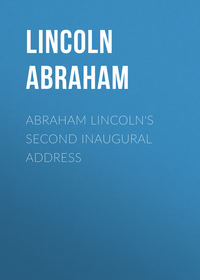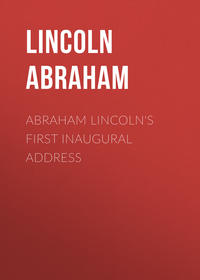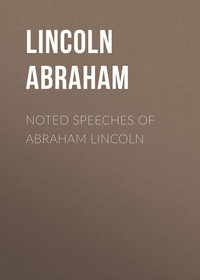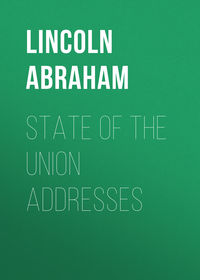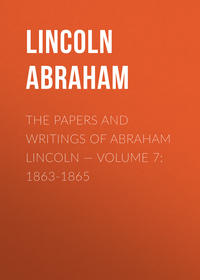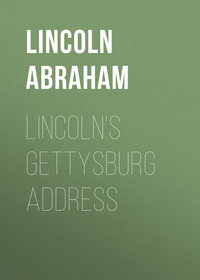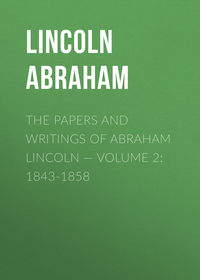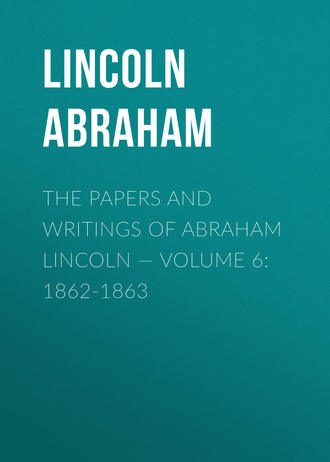 полная версия
полная версияThe Papers And Writings Of Abraham Lincoln — Volume 6: 1862-1863
MY DEAR GENERAL: — I do not remember that you and I ever met personally. I write this now as a grateful acknowledgment of the almost inestimable service you have done the Country. I write to say a word further. When you first reached the vicinity of Vicksburg, I thought you should do what you finally did — march the troops across the neck, run the batteries with the transports, and thus go below; and I never had any faith except a general hope that you knew better than I, that the Yazoo Pass expedition and the like could succeed. When you dropped below, and took Port Gibson, Grand Gulf, and vicinity, I thought you should go down the river and join General Banks; and when you turned northward, east of the Big Black, I feared it was a mistake. I now wish to make the personal acknowledgment that you were right and I was wrong.
Yours very truly,
A. LINCOLN.
TELEGRAM TO GENERAL J. M. SCHOFIELD
WAR DEPARTMENT, WASHINGTON, July 13, 1863GENERAL SCHOFIELD. St. Louis, Mo.:
I regret to learn of the arrest of the Democrat editor. I fear this loses you the middle position I desired you to occupy. I have not learned which of the two letters I wrote you it was that the Democrat published, but I care very little for the publication of any letter I have written. Please spare me the trouble this is likely to bring.
A. LINCOLN.
SON IN COLLEGE DOES NOT WRITE HIS PARENTS
TELEGRAM TO R. T. LINCOLNWAR DEPARTMENT, WASHINGTON D.C., July 14, 1863.
ROBERT T. LINCOLN: New York, Fifth Avenue Hotel:
Why do I hear no more of you?
A. LINCOLN.
INTIMATION OF ARMISTICE PROPOSALS
FROM JAMES R. GILMORE TO GOVERNOR VANCE OF NORTH CAROLINA,WITH THE PRESIDENT'S INDORSEMENT. PRESIDENT'S ROOM, WHITE HOUSE, WASHINGTON,
July [15?] 1864.
HIS EXCELLENCY ZEBULON B. VANCE.
MY DEAR SIR: — My former business partner, Mr. Frederic Kidder, of Boston, has forwarded to me a letter he has recently received from his brother, Edward Kidder, of Wilmington, in which (Edward Kidder) says that he has had an interview with you in which you expressed an anxiety for any peace compatible with honor; that you regard slavery as already dead, and the establishment of the Confederacy as hopeless; and that you should exert all your influence to bring about any reunion that would admit the South on terms of perfect equality with the North.
On receipt of this letter I lost no time in laying it before the President of the United States, who expressed great gratification at hearing such sentiments from you, one of the most influential and honored of the Southern governors, and he desires me to say that he fully shares your anxiety for the restoration of peace between the States and for a reunion of all the States on the basis of the abolition of slavery — the bone we are fighting over — and the full reinstatement of every Confederate citizen in all the rights of citizenship in our common country. These points conceded, the President authorizes me to say that he will be glad to receive overtures from any man, or body of men, who have authority to control the armies of the Confederacy; and that he and the United States Congress will be found very liberal on all collateral points that may come up in the settlement.
His views on the collateral points that may naturally arise, the President desires me to say he will communicate to you through me if you should suggest the personal interview that Mr. Edward Kidder recommends in his letter to his brother. In that case you will please forward to me, through Mr. Kidder, your official permit, as Governor of North Carolina, to enter and leave the State, and to remain in it in safety during the pendency of these negotiations, which, I suppose, should be conducted in entire secrecy until they assume an official character. With high consideration, I am,
Sincerely yours,
JAMES R. GILMORE.
[Indorsement.]
This letter has been written in my presence, has been read by me, and has my entire approval. A.L.
PROCLAMATION FOR THANKSGIVING, JULY 15, 1863
BY THE PRESIDENT OF THE UNITED STATES OF AMERICA:A Proclamation.
It has pleased Almighty God to hearken to the supplications and prayers of an afflicted people, and to vouchsafe to the army and navy of the United States victories on land and on the sea so signal and so effective as to furnish reasonable grounds for augmented confidence that the Union of these States will be maintained, their Constitution preserved, and their peace and prosperity permanently restored. But these victories have been accorded not without sacrifices of life, limb, health, and liberty, incurred by brave, loyal, and patriotic citizens. Domestic affliction in every part of the country follows in the train of these fearful bereavements. It is meet and right to recognize and confess the presence of the Almighty Father, and the power of His hand equally in these triumphs and in these sorrows.
Now, therefore, be it known that I do set apart Thursday, the 6th day of August next, to be observed as a day for national thanksgiving, praise, and prayer, and I invite the people of the United States to assemble on that occasion in their customary places of worship, and, in the forms approved by their own consciences, render the homage due to the Divine Majesty for the wonderful things He has done in the nation's behalf, and invoke the influence of His Holy Spirit to subdue the anger which has produced and so long sustained a needless and cruel rebellion, to change the hearts of the insurgents, to guide the counsels of the Government with wisdom adequate to so great a national emergency, and to visit with tender care and consolation throughout the length and breadth of our land all those who, through the vicissitudes of marches, voyages, battles, and sieges have been, brought to suffer in mind, body, or estate, and finally to lead the whole nation through the paths of repentance and submission to the Divine Will back to the perfect enjoyment of union and fraternal peace.
In witness whereof, I have hereunto set my hand and caused the seal of the United States to be affixed.
Done at the city of Washington, this fifteenth day of July, in the year of our Lord one thousand eight hundred and sixty-three, and of the independence of the United States of America the eighty-eighth.
A. LINCOLN.
By, the President WILLIAM H. SEWARD,
Secretary of State.
TELEGRAM TO L. SWETT
[Cipher.]WAR DEPARTMENT, WASHINGTON CITY, July 15, 1863.
HON. L SWETT, San Francisco, Cal.:
Many persons are telegraphing me from California, begging me for the peace of the State to suspend the military enforcement of the writ of possession in the Almaden case, while you are the single one who urges the contrary. You know I would like to oblige you, but it seems to me my duty in this case is the other way.
A. LINCOLN.
TELEGRAM TO SIMON CAMERON
[Cipher.]WAR DEPARTMENT, WASHINGTON CITY, JULY 15, 1863.
HON. SIMON CAMERON, Harrisburg, Pa.:
Your despatch of yesterday received. Lee was already across the river when you sent it. I would give much to be relieved of the impression that Meade, Couch, Smith, and all since the battle at Gettysburg, have striven only to get Lee over the river without another fight. Please tell me, if you know, who was the one corps commander who was for fighting in the council of war on Sunday night.
A. LINCOLN.
TELEGRAM TO J. O. BROADHEAD
WASHINGTON, D.C., JULY 15, 1863J. O. BROADHEAD, St. Louis, Mo.:
The effect on political position of McKee's arrest will not be relieved any by its not having been made with that purpose.
A. LINCOLN.
TO GENERAL LANE
EXECUTIVE MANSION, WASHINGTON, July 17 1863HON. S. H. LANE.
MY DEAR SIR: — Governor Carney has not asked to [have] General Blunt removed, or interfered with, in his military operations. He has asked that he, the Governor, be allowed to commission officers for troops raised in Kansas, as other governors of loyal States do; and I think he is right in this.
He has asked that General Blunt shall not take persons charged with civil crimes out of the hands of the courts and turn them over to mobs to be hung; and I think he is right in this also. He has asked that General Ewing's department be extended to include all Kansas; and I have not determined whether this is right or not.
Yours truly,
A. LINCOLN.
TELEGRAM TO GOVERNOR MORTON
WASHINGTON, D. C., July 18, 1863GOVERNOR O. P. MORTON, Indianapolis:
What do you remember about the case of John O. Brown, convicted of mutinous conduct and sentenced to death? What do you desire about it?
A. LINCOLN.
TO GOVERNOR PARKER
EXECUTIVE MANSION, WASHINGTONJuly 20, 1863.
HIS EXCELLENCY JOEL PARKER, Governor of New Jersey.
DEAR SIR: — Yours of the 15th has been received, and considered by the Secretary of War and myself. I was pained to be informed this morning by the Provost-Marshal-General that New Jersey is now behind twelve thousand, irrespective of the draft. I did not have time to ascertain by what rules this was made out; and I shall be very glad if it shall, by any means, prove to be incorrect. He also tells me that eight thousand will be about the quota of New Jersey on the first draft; and the Secretary of War says the first draft in that State would not be made for some time in any event. As every man obtained otherwise lessens the draft so much, and this may supersede it altogether, I hope you will push forward your volunteer regiments as fast as possible.
It is a very delicate matter to postpone the draft in one State, because of the argument it furnishes others to have postponement also. If we could have a reason in one case which would be good if presented in all cases, we could act upon it.
I will thank you, therefore, to inform me, if you can, by what day, at the earliest, you can promise to have ready to be mustered into the United States service the eight thousand men.
If you can make a reliable promise (I mean one which you can rely on yourself) of this sort, it will be of great value, if the day is not too remote.
I beg you to be assured I wish to avoid the difficulties you dread as much as yourself.
Your obedient servant,
A. LINCOLN
TO GENERAL SCHOFIELD
EXECUTIVE MANSION, WASHINGTON D.C. JULY 20, 1863MAJOR GENERAL JOHN M. SCHOFIELD.
MY DEAR GENERAL: — I have received and read your letter of the 14th of July.
I think the suggestion you make, of discontinuing proceedings against Mr. McKee, a very proper one. While I admit that there is an apparent impropriety in the publication of the letter mentioned, without my consent or yours, it is still a case where no evil could result, and which I am entirely willing to overlook.
Yours truly,
A. LINCOLN.
TELEGRAM TO GENERAL J. M. SCHOFIELD
WASHINGTON, D.C. JULY 22, 1863MAJOR GENERAL SCHOFIELD, St. Louis, Mo.:
The following despatch has been placed in my hands. Please look to the subject of it.
LEXINGTON, Mo., JULY 21, 1863 HON. S C. POMEROY: Under Orders No.63 the sheriff is arresting slaves of rebels inside our lines, and returning them in great numbers. Can he do it? Answer. GOULD.
A. LINCOLN
TO POSTMASTER-GENERAL BLAIR
EXECUTIVE MANSION, WASHINGTON,JULY 24, 1863. HON. POSTMASTER-GENERAL
SIR: — Yesterday little indorsements of mine went to you in two cases of postmasterships sought for widows whose husbands have fallen in the battles of this war. These cases occurring on the same day brought me to reflect more attentively than I had before done, as to what is fairly due from us herein the dispensing of patronage toward the men who, by fighting our battles, bear the chief burden of serving our country. My conclusion is that, other claims and qualifications being equal, they have the better right and this is especially applicable to the disabled and the soldier, deceased soldier's family.
Your obedient servant,
A. LINCOLN
TO SECRETARY OF THE NAVY
EXECUTIVE MANSION, WASHINGTON, July 25, 1863HON. SECRETARY OF THE NAVY.
SIR: — Certain matters have come to my notice, and considered by me, which induce me to believe that it will conduce to the public interest for you to add to the general instructions given to our naval commanders in relation to contraband trade propositions substantially as follows, to wit:
First. You will avoid the reality, and as far as possible the appearance, of using any neutral port to watch neutral vessels and then to dart out and seize them on their departure.
NOTE. — Complaint is made that this has been practiced at the port of St Thomas, which practice, if it exists, is disapproved and must cease.
Second. You will not in any case detain the crew of a captured neutral vessel or any other subject of a neutral power on board such vessel, as prisoners of war or otherwise, except the small number necessary as witnesses in the prize court.
NOTE. — The practice here forbidden is also charged to exist, which, if true, is disapproved and must cease.
My dear sir, it is not intended to be insinuated that you have been remiss in the performance of the arduous and responsible duties of your department, which, I take pleasure in affirming, has in your hands been conducted with admirable success. Yet, while your subordinates are almost of necessity brought into angry collision with the subjects of foreign states, the representatives of those states and yourself do not come into immediate contact for the purpose of keeping the peace, in spite of such collisions. At that point there is an ultimate and heavy responsibility upon me.
What I propose is in strict accordance with international law, and is therefore unobjectionable; whilst, if it does no other good, it will contribute to sustain a considerable portion of the present British ministry in their places, who, if displaced, are sure to be replaced by others more unfavorable to us.
Your obedient servant,
A. LINCOLN
LETTER TO GOVERNOR PARKER
EXECUTIVE MANSION, WASHINGTON,July 25, 1863.
HIS EXCELLENCY GOVERNOR JOEL PARKER.
SIR: — Yours of the 21st is received, and I have taken time and considered and discussed the subject with the Secretary of War and Provost-Marshal General, in order, if possible, to make you a more favorable answer than I finally find myself able to do.
It is a vital point with us to not have a special stipulation with the governor of any one State, because it would breed trouble in many, if not all, other States; and my idea was when I wrote you, as it still is, to get a point of time to which we could wait, on the reason that we were not ready ourselves to proceed, and which might enable you to raise the quota of your State, in whole, or in large part, without the draft. The points of time you fix are much farther off than I had hoped. We might have got along in the way I have indicated for twenty, or possibly thirty, days. As it stands, the best I can say is that every volunteer you will present us within thirty days from this date, fit and ready to be mustered into the United States service, on the usual terms, shall be pro tanto an abatement of your quota of the draft. That quota I can now state at eight thousand seven hundred and eighty-three (8783). No draft from New Jersey, other than for the above quota, will be made before an additional draft, common to [all] the States, shall be required; and I may add that if we get well through with this draft, I entertain a strong hope that any further one may never be needed. This expression of hope, however, must not be construed into a promise.
As to conducting the draft by townships, I find it would require such a waste of labor already done, and such an additional amount of it, and such a loss of time, as to make it, I fear, inadmissible.
Your obedient servant,
A. LINCOLN.
P. S. — Since writing the above, getting additional information, I am enabled to say that the draft may be made in subdistricts, as the enrolment has been made, or is in process of making. This will amount practically to drafting by townships, as the enrollment subdistricts are generally about the extent of townships. A.L.
To GENERAL G. G. MEADE. (Private.)
EXECUTIVE MANSION, WASHINGTON, July 27, 1863MAJOR-GENERAL MEADE:
I have not thrown General Hooker away; and therefore I would like to know whether it would be agreeable to you, all things considered, for him to take a corps under you, if he himself is willing to do so. Write me in perfect freedom, with the assurance that I will not subject you to any embarrassment by making your letter or its contents known to any one. I wish to know your wishes before I decide whether to break the subject to him. Do not lean a hair's breadth against your own feelings, or your judgment of the public service, on the idea of gratifying me.
Yours truly,
A. LINCOLN
TELEGRAM TO GENERAL A. B. BURNSIDE
WAR DEPARTMENT, WASHINGTON, July 27, 1863MAJOR-GENERAL BURNSIDE, Cincinnati, O.:
Let me explain. In General Grant's first despatch after the fall of Vicksburg, he said, among other things, he would send the Ninth Corps to you. Thinking it would be pleasant to you, I asked the Secretary of War to telegraph you the news. For some reasons never mentioned to us by General Grant, they have not been sent, though we have seen outside intimations that they took part in the expedition against Jackson. General Grant is a copious worker and fighter, but a very meager writer or telegrapher. No doubt he changed his purpose in regard to the Ninth Corps for some sufficient reason, but has forgotten to notify us of it.
A. LINCOLN.
TO GENERAL H. W. HALLECK
EXECUTIVE MANSION, July 29, 1863MAJOR-GENERAL HALLECK:
Seeing General Meade's despatch of yesterday to yourself causes me to fear that he supposes the Government here is demanding of him to bring on a general engagement with Lee as soon as possible. I am claiming no such thing of him. In fact, my judgment is against it; which judgment, of course, I will yield if yours and his are the contrary. If he could not safely engage Lee at Williamsport, it seems absurd to suppose he can safely engage him now, when he has scarcely more than two thirds of the force he had at Williamsport, while it must be that Lee has been reinforced. True, I desired General Meade to pursue Lee across the Potomac, hoping, as has proved true, that he would thereby clear the Baltimore and Ohio Railroad, and get some advantages by harassing him on his retreat. These being past, I am unwilling he should now get into a general engagement on the impression that we here are pressing him, and I shall be glad for you to so inform him, unless your own judgment is against it.
Yours truly,
A. LINCOLN.
H. W. HALLECK, General-in-Chief.
TO SECRETARY STANTON
EXECUTIVE MANSION, WASHINGTON, July 29, 1863HON. SECRETARY OF WAR.
SIR: — Can we not renew the effort to organize a force to go to western Texas?
Please consult with the general-in-chief on the subject.
If the Governor of New Jersey shall furnish any new regiments, might not they be put into such an expedition? Please think of it.
I believe no local object is now more desirable.
Yours truly,
A. LINCOLN.
ORDER OF RETALIATION
EXECUTIVE MANSION, WASHINGTON, July 30, 1863It is the duty of every government to give protection to its citizens, of whatever class, color, or condition, and especially to those who are duly organized as soldiers in the public service. The law of nations and the usages and customs of war, as carried on by civilized powers, permit no distinction as to color in the treatment of prisoners of war as public enemies. To sell or enslave any captured person, on account of his color and for no offense against the laws of war, is a relapse into barbarism, and a crime against the civilization of the age.
The Government of the United States will give the same protection to all its soldiers; and if the enemy shall sell or enslave any one because of his color, the offense shall be punished by retaliation upon the enemy's prisoners in our possession.
It is therefore ordered that for every soldier of the United States killed in violation of the laws of war, a rebel soldier shall be executed; and for every one enslaved by the enemy or sold into slavery, a rebel soldier shall be placed at hard labor on the public works, and continued at such labor until the other shall be released and receive the treatment due to a prisoner of war.
A. LINCOLN.
TO GENERAL S. A. HURLBUT
EXECUTIVE MANSION, WASHINGTON, July 31, 1863MY DEAR GENERAL HURLBUT:
Your letter by Mr. Dana was duly received. I now learn that your resignation has reached the War Department. I also learn that an active command has been assigned you by General Grant. The Secretary of War and General Halleck are very partial to you, as you know I also am. We all wish you to reconsider the question of resigning; not that we would wish to retain you greatly against your wish and interest, but that your decision may be at least a very well-considered one.
I understand that Senator [William K.] Sebastian, of Arkansas, thinks of offering to resume his place in the Senate. Of course the Senate, and not I, would decide whether to admit or reject him. Still I should feel great interest in the question. It may be so presented as to be one of the very greatest national importance; and it may be otherwise so presented as to be of no more than temporary personal consequence to him.
The Emancipation Proclamation applies to Arkansas. I think it is valid in law, and will be so held by the courts. I think I shall not retract or repudiate it. Those who shall have tasted actual freedom I believe can never be slaves or quasi-slaves again. For the rest, I believe some plan substantially being gradual emancipation would be better for both white and black. The Missouri plan recently adopted, I do not object to on account of the time for ending the institution; but I am sorry the beginning should have been postponed for seven years, leaving all that time to agitate for the repeal of the whole thing. It should begin at once, giving at least the new-born a vested interest in freedom which could not be taken away. If Senator Sebastian could come with something of this sort from Arkansas, I, at least, should take great interest in his case; and I believe a single individual will have scarcely done the world so great a service. See him if you can, and read this to him; but charge him not to make it public for the present. Write me again.


